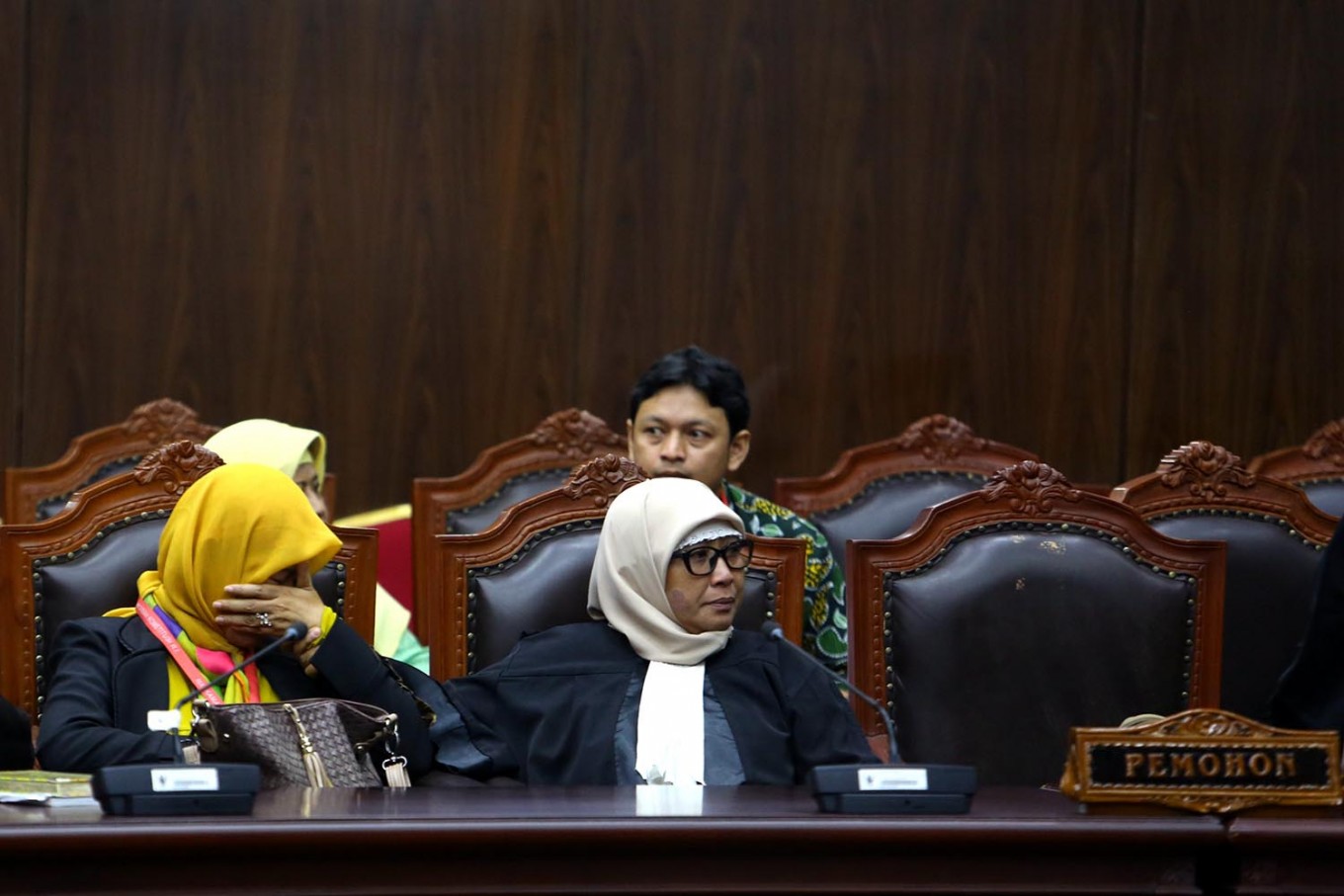'Feminism is not for Indonesia’: Conservative Muslims' recipe for women's empowerment
The two warring groups both have highly educated women as members who express their opinions with confidence, are politically active and have made achievements in their lives. However, at some point, these empowered women who fight for women's empowerment have parted ways.
Change Size
 Evi Risna Yanti (left), the lawyer of 12 individuals who sought to ban premarital sex and same-sex relationships with a petition for a judicial review by the Constitutional Court, weeps after the court rejects their petition in December 2017. (JP/Seto Wardhana.)
Evi Risna Yanti (left), the lawyer of 12 individuals who sought to ban premarital sex and same-sex relationships with a petition for a judicial review by the Constitutional Court, weeps after the court rejects their petition in December 2017. (JP/Seto Wardhana.)
M
aimon Herawati is an accomplished woman who believes in equal opportunity for women. She finished her Master's degree at Abertay University in the United Kingdom in 2003, securing tenure as a lecturer of mass communication science in West Java's Padjadjaran University and then juggling her family life with her social and political activities.
She has participated in various activities in her community, including a “Free Palestine” movement.
Maimon is one of many empowered women who has been politically active but has worked against the feminist movement in Indonesia, including by protesting against a bill that is intended to eradicate sexual violence. Such women have been in a cultural clash against Indonesian feminists on several other issues, like the Pornography Law and, most recently, the family resilience bill.
The two warring groups both have highly educated women as members who express their opinions with confidence, are politically active and have made achievements in their lives. However, at some point, these empowered women who fight for women's empowerment have parted ways.
Read also: People's sex lives none of your business, Komnas Perempuan tells court
Antifeminist groups claim the sexual violence bill is “pro-adultery” since it only criminalizes nonconsensual sex. They said the bill should instead prohibit all extramarital sex, consensual or not.
Objections by the antifeminist group have halted deliberations over the bill, triggering protests from women's rights activists. The bill's supporters said they believe that since it defines more types of sexual violence than the prevailing Criminal Code, it would end impunity for sexual violence perpetrators and provide more help to survivors.
Neng Dara Afifah, the author of Muslimah Feminis: Penjelajahan Multi Identitas (Muslim Feminists: Multi-Identity Exploration), said the antifeminist movement had become counterproductive to gender mainstreaming efforts.
"What they are doing is a form of betrayal of feminism, which has allowed them to access the public sphere and eventually express their ideas," said the Syarif Hidayatullah Islamic State University lecturer.
Maimon disagreed. She said she could be active politically because Islam allowed women to be so. Islam, she said, introduced gender equality some 14 centuries ago, long before feminism did.
Islam, which emerged from Arabian society during the so-called Age of Ignorance, had elevated women's dignity from being considered merely as property to having the right to inherit and secure their own property, Maimon said. She said she refused to be associated with feminism because "the idea came from the Western world, which is antithetical to Islamic values".
Maimon said that one of the basic principles of feminism that collides with Islamic principles is the notion of "my body is mine", meaning women possess full authority over their own bodies, no one else has the right to control them and they can wear whatever they want over their bodies in public. However, in Islam it does not work that way, Maimon explained.
"My body is not mine. It's a mandate from God, so I cannot just do what I please on my body," she said.
Another prominent figure among conservative Muslims is Euis Sunarti, a professor of family studies at the Bogor Agricultural Institute. Euis said feminism was problematic for Indonesia because its "liberal" values conflicted with the values of Islam, which were adopted by a majority of Indonesian citizens.
Feminism, she claimed, does not recognize the "division of roles" between men and women, husbands and wives. If a husband works and earns a certain amount of money, the wife should also do the same to achieve the goal of equality, Euis said.
"In fact, it does not have to be that way. If a married couple is committed to building a family and have children, then who should focus more on raising the kids?" Euis asked. She suggested mothers as the ones giving birth should take more responsibility in child-rearing but added that that did not mean mothers could not "actualize" themselves by participating in public affairs.
Women's rights activist Nursyahbani Katjasungkana clarified that feminism did not put money or power above all, but instead "fights for equal rights between men and women, inside and outside their homes".
Instead of applying gender stereotypes to domestic roles, Nursyahbani said, feminism actually promoted "cooperation within households" by which both parties were encouraged to play active roles in taking care of domestic affairs, "unlike the rigid role of husbands and wives as stipulated in the 1974 Marriage Law".
Article 31 of the law regulates that "husbands are the heads of the households and wives are homemakers". Article 34 further states that husbands are obliged to fulfill the family's needs, while the responsibility of wives is to properly manage domestic affairs.
"We want to eliminate the rigid legal norms because they're inconsistent with the social reality, where many women actually act as breadwinners in their respective families," said the founder of the Indonesian Women's Coalition and the Legal Aid Foundation of Indonesian Women Association for Justice.
Editor's note: This article has been updated to clarify Euis Sunarti's statement about the role of mothers.









